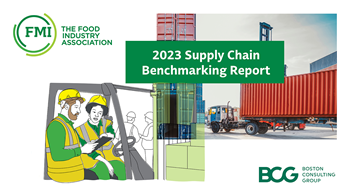By: Doug Baker, Vice President, Industry Relations, FMI

The food industry is emerging from post-pandemic supply chain disruptions; however, there is much work needed to restore supply chain equilibrium. There continue to be ongoing disruptions creating demand forecasting challenges and supply chain fulfillment volatility.
2020 was a challenging year for the food industry supply chain, with many disruptions requiring enhanced trading partner collaboration and an industry-wide coordinated response to address high inflation, volatile consumer shopping behaviors, softening demand, labor shortages, the war in Ukraine, extreme weather conditions and challenges associated with product allocations.
Companies and trading partners are focused on managing supply chain complexity, leading organizational change by driving performance improvements to reduce cost, address inefficiency and fulfill demand to better serve consumers.
FMI, in partnership with the Boston Consulting Group, has released the 2023 Supply Chain Benchmarking report, which report provides key quantitative performance metrics, qualitative industry perspectives and actionable insights to enhance supply chain performance. The focus of the report is to address and solve issues that are important and urgent today while looking for new innovations that will impact future supply chain performance.
This benchmarking helps companies and supply chain professionals understand the unique food industry supply chain ecosystem. The insights and metrics assist food retailers, wholesalers, and CPGs to better understand the drivers of performance across the value chain, benchmark their own performance, and look to deliver better service to consumers while managing cost and working capital.
The report assesses 2022 and early 2023 supply chain performance through the lens of five key themes:
- Service: Investigate service performance across the value chain through on-shelf.
- Cost: Assess freight & warehousing costs and drivers of cost shifts.
- Inventory: Analyze how inventory has been trending.
- Warehousing Performance: Understand efficiency and labor performance.
- Logistics Performance: Understand dwell time, backhaul, and transportation performance.
The report is specifically designed for supply chain, merchandising, and sales executives on the demand and supply side. By leveraging this work, we will continue to raise awareness, anticipate challenges and opportunities, and problem-solve key supply chain issues to drive profitable growth.
The benchmarking report identifies four themes across grocery supply chains:
- Service recovery: In 2022, retailers showed strong on-shelf availability improvements despite a suboptimal service performance for CPGs.
- Cost pressure: Costs have risen more quickly than revenues, putting pressure on the food industry value chain to manage costs, particularly CPG suppliers who bear a larger share of the plant-to-shelf costs.
- Labor: Labor challenges remain persistent, leading the food industry to restructure operating models and make investments that limit costs and reduce labor dependency.
- Building advantage: With the COVID-19 crisis fading and softening demand, supply chain leaders are looking at transformational capability investments to deliver service, growth and create a step-change advantage in cost management.
Looking ahead, with softening demand and fewer supply chain disruptions, service performance is expected to improve in 2023. As service levels recover, trading partners across the value chain will need to seek opportunities to reduce logistics costs.
Investing in automation and labor retention programs will ensure business continuity, maintain service levels, and limit cost variations. Supply chain leaders are identifying opportunities across the value chain to improve operational efficiency, costs, and better enable enterprise business strategy.
Further findings from the Supply Chain Benchmarking report will be provided at the 2023 FMI Supply Chain Forum in Texas on September 26-28, 2023.


 Industry Topics address your specific area of expertise with resources, reports, events and more.
Industry Topics address your specific area of expertise with resources, reports, events and more.
 Our Research covers consumer behavior and retail operation benchmarks so you can make informed business decisions.
Our Research covers consumer behavior and retail operation benchmarks so you can make informed business decisions.
 Events and Education including online and in-person help you advance your food retail career.
Events and Education including online and in-person help you advance your food retail career.
 Food Safety training, resources and guidance that help you create a company food safety culture.
Food Safety training, resources and guidance that help you create a company food safety culture.
 Government Affairs work — federal and state — on the latest food industry policy, regulatory and legislative issues.
Government Affairs work — federal and state — on the latest food industry policy, regulatory and legislative issues.
 Get Involved. From industry awards to newsletters and committees, these resources help you take advantage of your membership.
Get Involved. From industry awards to newsletters and committees, these resources help you take advantage of your membership.
 Best practices, guidance documents, infographics, signage and more for the food industry on the COVID-19 pandemic.
Best practices, guidance documents, infographics, signage and more for the food industry on the COVID-19 pandemic.
